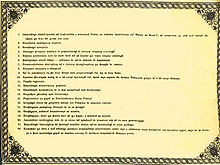Islaz proclamation
The Islaz Proclamation was a document in which the Romanian revolutionaries of 1848 summarized their demands on Wallachia . It is considered the programmatic basis of the revolution of 1848 in Wallachia.
Emergence
June 10th jul. / June 22, 1848 greg. 30,000 to 40,000 Wallachian peasants, intellectuals returning from France and part of the Wallachian army under the commandant Christian Tell gathered in Islaz on the Danube and passed their demands for the revolutionary transformation of Wallachia. A provisional government consisting of Ion Heliade-Rădulescu , Nicolae Golescu and Christian Tell was also constituted at the meeting . Two days after the meeting, the principality's capital, Bucharest , also revolted , and the provisional government became part of the “governorship” there. This revolutionary government stayed in office for three months. Heliade-Rădulescu read the text of the proclamation in Islaz. 8,000 copies of the proclamation were printed, and 105 commissioners were commissioned to explain its content to the rural population, who at the time were mostly illiterate .
content
The proclamation comprises a total of 43 paragraphs and is divided into a more argumentative, an appellative and a programmatic - informative part. Your text contains references to Christianity and the Enlightenment. The people, understood as a community of citizens, is declared a sovereign power. The control of foreign powers over Wallachia is to come to an end; at that time these were the Ottoman and Russian empires . However, this requirement is formulated very carefully. The people should elect a ruler for a period of five years, and Wallachia should send an envoy to the Sublime Porte in Istanbul . There should be freedom of the press and freedom of movement, property should be guaranteed, tax liability should apply universally, also for boyars , a constituent assembly should be elected by all social classes, men and women should have equal and free access to education, all religious communities should be assimilated, the death penalty and corporal punishment are abolished. Fronbauern should receive their own land, but the landowners should be compensated for it, the serfdom of the Roma on state land and church property should be abolished, but retained in the private sector. The elected ruler should face a freely elected national assembly. The text also includes the name of the country as Ţeara română and the national colors. The establishment of a national bank is also mentioned. The proclamation closes with the call to fight for freedom with arms.
Consequences
The Wallachian prince Gheorghe Bibescu signed the proclamation the day after it was passed and then left the country.
The text was rejected by opponents as "liberal" and "smelling of socialism". When it came to land ownership, the revolutionaries acted more moderately so as not to annoy the big landowners. Among the revolutionaries there was a moderate camp around Rădulescu and a more radical one around Nicolae Bălcescu . There was disagreement on the question of the relationship with the great powers that exercised supremacy over Wallachia. Sometimes they advocated suzerainty under the Ottoman Empire, sometimes a republic in the alliance of European republics. In particular, the “ Organic Regulations ” imposed by Russia were rejected. Serfdom was abolished in July 1848, but replaced by leases between the farmers and the large landowners, who kept them dependent. A Wallachian “envoy” in Istanbul was appointed. In September 1848, Ottoman troops occupied Wallachia and ended the uprising. Most of the revolutionaries were able to flee abroad, many of them first made their way to the island of Chios . From there, Heliade-Rădulescu in particular continued to draw attention to the situation in Wallachia as a journalist until he, like Golescu and Tell, returned to his homeland at the end of the 1850s.
swell
- Proclamația de la Islaz , text of the proclamation on Wikisource (Romanian)
- The emergence of the Romanian constitutional discourse in the 19th century , Petrea Lindenbauer, Vienna 2010, especially Section VII.2. Islaz Proclamation, June 9-21, 1848, pp. 18, 163-174
Individual evidence
- ^ Richard Wagner, Sonderweg Romania. Berlin 1991, ISBN 3-88022-047-6 , p. 29
